Roz Savage's Blog, page 29
January 8, 2014
Adventure Podcast #17: Anna Hughes, Round-Britain Cyclist
In the summer of 2011, Anna Hughes cycled 4,000 miles around Britain, taking 10 weeks. In spring 2013, she did the same trip, by sailing boat.
She is presently writing a book about her adventure – I’ve had the privilege of having a sneak preview, and very much enjoyed it.
She is a self-confessed cycling nut, not only cycling to work, but also to weddings, or making a 120-mile roundtrip for a cup of tea, and even moved house by bicycle.
Inner Strengths – Innate or Learned?
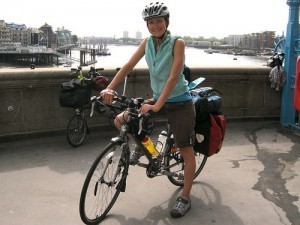
Anna Hughes
“This was my adventure, and I was doing it. What did I need to know, really? Nothing that the road wouldn’t teach me.”
(Anna Hughes, from the draft of Eat Sleep Cycle)
I loved hearing Anna describe the process of discovering her inner strengths during the course of her epic cycle ride around Britain. She was at first surprised when her sister described her as “passionate and determined” – but then realised that maybe the description was true. Regardless of whether she felt comfortable with the words, the way she set about executing her expedition embodied both passion and determination.
I went through a similar experience on the Atlantic, when I found that people were posting encouraging comments on my blog, praising my “resourcefulness” and “tenacity”. These were not words I had previously associated with myself, so my first reaction was, “who, me?”. But then I thought, “why NOT me?”. I wrote the words on a board in front of my rowing position, and every day behaved like a resourceful and tenacious person – until I became one.
It got me thinking about whether these qualities are innate (or possibly, in some cases, not) or whether they can be learned – in which case anybody can learn them. After due consideration, I am certain that they can be learned.
I will rest my case upon the concept of neuroplasticity (ooh, I do like using long words). Brain scientists have discovered that we actually change the structure of our brains according to the thoughts that we think. To a much greater extent than most people realise, we are not hard-wired, but are incredibly re-programmable. We can overcome even entrenched self-limiting beliefs by running a different programme consistently over a period of time until that new programme/belief system becomes our default mode.
Don’t take my word for it – check out VS Ramachandran’s TED Talk: 3 Clues To Understanding Your Brain.
What is the best way to achieve escape velocity, to get away from your old thought patterns? Take to the road, get away from your old habits and routines and old ways of thinking. Have an adventure. Try out a new way of being in the world, a more adventurous version of yourself. Every day tell yourself, “I am an adventurer. I am passionate. I am determined.”
And like the Cowardly Lion in the Wizard of Oz, you’ll find that all along, you had the nerve.
“All that we are is a result of what we have thought.” (Buddha)
“When I see an adult on a bicycle, I do not despair for the future of the human race.” (H G Wells)
To subscribe to the show via RSS or iTunes, please click on the appropriate button below.
Show Notes
0:50 A thank you to our sponsors, Audible.com, and Vic’s book recommendation: The Doomsday Book, by Connie Willis
To claim your free audiobook, please follow the Adventure Podcast affiliate link to www.audibletrial.com/adventurepodcast
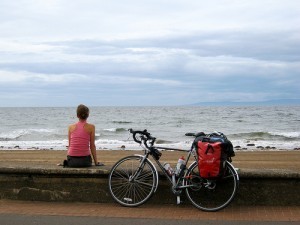
Cycling to the sea
4:10 Introducing Anna Hughes
5:45 How did it all start?
7:00 The magic of cycling
8:15 Cycling to the Sea
9:30 Inspired by Al Humphreys
10:30 Bicycle and bike bags
12:30 A day in the life of a round-Britain cyclist
17:45 Schedule versus spontaneity
20:30 Getting to know Britain
23:30 How did the journey change her?
27:15 Sailing the coast of Britain
32:00 Sustrans, and 3 good reasons to ride a bike
34:15 Important notes on cycle safety
37:00 What next? Boatylicious and the Great Pacific Rowing Race
39:00 Staying in touch with Anna
Links
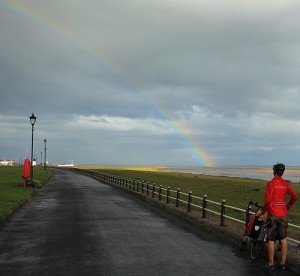
The joy of the open road
WarmShowers.org - hospitality for cyclists
RoundBritainExperience (sailing trip)
Barclays hire bikes (aka Boris’s bikes)
Anna’s blog on Cycling to the Sea
On cycling safety:
- What’s going on with all these cyclists’ deaths?
All photo credits – Anna Hughes
December 25, 2013
Season’s Greetings!

Happy Christmas!
Wherever you are, whatever you are doing, and whoever you are spending this Christmas period with, I hope you are and all who are dear to you are having a wonderful time.
But realising that there will also be many for whom a happy holiday is not an option – if poverty, sickness, bereavement, depression, or the difficulties of life in general, mean that this is not such a joyous time of year for you – I send you especially my love and best wishes, and a glimmer of optimism that 2014 may offer better times ahead.
Happy or sad, I hope you’ll enjoy my New Year’s gift to you – An Ocean Rower’s Top Tips for Happiness and Meaning. Just click on that link to take you to the download page. And please feel free to forward it on to anybody you know who might appreciate its message.
I’m with my dear old mother for my birthday on the 23rd, then spending a few days with my partner, then we’re off to the Renaissance Weekend in Charleston where I’m giving a number of presentations and other contributions. We have a special side-event at the Charleston Library on Dec 30th at 5.30pm, if you want to come along. Just contact me for details.
Wishing you all the very best for the remainder of 2013, and a stellar start to 2014!
And here is a special Christmas podcast message from me and Producer Vic.
To subscribe to the show via RSS or iTunes, please click on the appropriate button below.
December 18, 2013
Adventure Podcast #16: Jordan Hanssen and Greg Spooner – Deep Teamwork
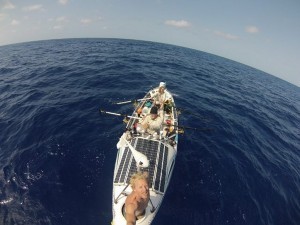
OAR Northwest
Jordan Hanssen and Greg Spooner formed half of the four-man crew, OAR Northwest, that won the first international ocean rowing race from New York to England – the North Atlantic Rowing Race in 2006. It took them 71 days, 3 hours, twenty-two minutes to complete the 3,100 nautical mile crossing. The biggest challenge turned out to be, not the cold or the sleep deprivation, but hunger, when they discovered that due to a miscalculation they did not have enough rations.
That adventure is documented in Jordan’s book, Rowing into the Son – one of the best ocean rowing books I’ve ever read.
Jordan and Greg followed that up by rowing around the Olympic Peninsula in 2008.
Then Jordan was part of a 4-man team – and Greg was expedition coordinator – aiming to row from Africa to the Americas at the start of this year, which came to a premature end after 73 days when two waves hit at just the wrong moment.
Deep Teamwork
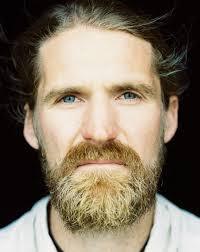
Jordan Hanssen
“There’s four people on that boat, so each person represents 25% of that boat’s power, so if you start saying things to someone and start isolating them, you’re hurting yourself.” (Jordan Hanssen)
Imagine that you’re starving hungry. Now imagine that you’re starving hungry, sleep-deprived, rowing 12 hours a day, and lurching around in a tiny rowboat in the chilly North Atlantic. And the guy who screwed up and got the rations wrong is sitting two feet away from you. Would you have the strength and wisdom not to give him a hard time about it – on an hourly basis?
I’m not sure I would. At least if anything was screwed up on my boat, I had only myself to blame.
OAR Northwest found themselves in this situation when Brad Vickers discovered that, due to his miscalculation over portion sizes, they were going to run out of food if they did not ration. Words were said, quite naturally, yet somehow they managed to hold the team together.
Apart from their methodical preparation and meticulous attention to detail, one of the aspects of OAR Northwest’s way of operating that impresses me most is their teamwork. And it started long before the voyage, when they chose to all move in together and share a house for the preceding year. So by the time they got in the boat, they already knew each other’s foibles, quirks, and idiosyncrasies – the things that could drive you crazy in extremis.
And I loved what Jordan said, quoted above. It strikes me that a lot of families and partners in relationships – even colleagues at work – could do to remember this. I’m sure we can all think of examples of dysfunctional groups that have lost sight of the goal, and devolved into point-scoring and infighting – most governments, for starters. Effective teamwork is not a battle of egos or trying to prove who is right or who is wrong – it’s about getting the job done.
To subscribe to the show via RSS or iTunes, please click on the appropriate button below.
Show Notes
0:45 Roz’s recommendation from Audible.com this week is the Outlander series, by Diana Gabaldon. Please follow our affiliate link to claim your free audiobook.
4:50 Apology for our sound quality (mostly Roz’s fault) and introducing our guests

Greg Spooner
7:00 Not small guys, these OAR Northwest rowers
7:45 How Greg and Jordan got into ocean rowing
10:30 The crew that lives and rows and eats together, stays together
13:15 Extreme hunger
16:25 Rowing Into The Son – Jordan’s book
17:00 Rowing the Olympic Peninsula – a variety pack of waterscapes
18:50 Having the right equipment makes a world of difference – geeking out on Gig Harbor Boatworks and wooden oars
24:20 The Mid-Atlantic Row 2013 – unlucky
28:00 The events of that fateful day: April 6
33:40 Getting the boat back, against the odds
35:00 If you’re planning an ocean row, here’s what you need to know about rescues
37:20 NBC to screen the story of the rescue
39:30 The education program
Links
Canadian Wildlife Federation – sponsors of the Mid Atlantic Row
December 11, 2013
Adventure Podcast #15: Sarah Outen, Ocean Rower Choosing Her Attitude
I first met Sarah Outen in Oxford in 2006, when she came up to me after a talk I was giving about my Atlantic crossing, to discuss her plans to row solo across the Indian Ocean.
At that point she was sporting her “Baldilocks” look – suffering from patchy alopecia, she took the bold move and shaved her head completely bald. This boldness epitomises so much about Sarah’s approach to life.
In 2009, Sarah duly rowed the Indian Ocean 2009, becoming the youngest person and first woman to do so.
Moving on to even greater things, on 1st April 2011 she set out to travel from London 2 London – via the World. She successfully cycled and kayaked as far as Japan, then set out to row the North Pacific, which didn’t go quite as planned….
You’ll remember Sarah’s name has come up before on the podcast, more than once – Dave Cornthwaite, with whom she stand-up paddled together, and Geoff Holt, the quadriplegic sailor – Sarah was part of his support team.
It was such a delight to have Sarah on the show. She and I have become good friends over the course of many years and many, many gin and tonics. I hope you enjoy our conversation as much as I did.
To subscribe to the show via RSS or iTunes, please click on the appropriate button below.
Choose Your Attitude
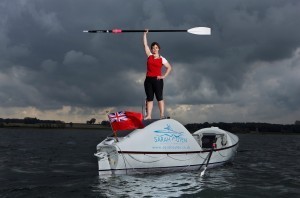
Sarah and Serendipity, her Indian Ocean boat
Few people have been through as many challenges – and emerged smiling – as Sarah Outen. It is not because she has an innate ability to cruise through problems, staying upbeat regardless. She feels things deeply, and her unstoppability is hard-earned.
She has coped with the loss of her beloved dad (to rheumatoid arthritis, while Sarah was still an undergraduate), loss of her hair (to alopecia, also while she was at Oxford), and the loss of her boat (Gulliver, lost when Sarah was hit by a typhoon 600 miles off the coast of Japan). She has battled with eczema, allergies, and depression.
In the podcast we talk about the difference between the challenges we choose (ocean rowing and other adventures) and the challenges that choose us. I get right up my own nose, sometimes, when I talk about my difficulties at sea as if they were a great hardship. Yes, they were hard, very hard, but I had chosen to be there, I chose to put myself in the way of danger and discomfort.
So many people don’t get to choose their challenges – bereavement, illness (physical or mental), looking after an ageing or sick relative, financial ruin, or any of the many other ways that life inflicts suffering on humans. Nor will they get to write books or give talks about their misfortunes, or have people come up to them and tell them how inspiring they are. They just have to get on with the pain and the drudgery, day after day, often with no end in sight.
How do we all get through it? When life seems solitary, poor, nasty, brutish, and short (per Thomas Hobbes), how do we persevere? Whether you have, or haven’t, chosen your challenge, there are some ideas that might help.
1. Remember that human beings are endlessly adaptable – once we accept a situation. It is only when you fight the existing reality that the friction and stress arises.

It doesn’t have to be fun to be worthwhile – but it helps!
2. Seek the positive in any situation. There will always be something, even if it is only knowing that at some point it will be over.
3. Allow yourself to be miserable. There are times when misery, even fear, are perfectly rational responses to the situation. Don’t fight it. If you need to, allow yourself to wallow in misery until you have exorcised it from your system. And then you can go back to keeping on keeping on (as per Leon McCarron).
4. Think of someone who is having a worse time than you. There is always someone who is having a worse time than you – sicker, poorer, longer or harder suffering. It could always be worse. Feeling compassionate towards someone else’s plight will put yours into perspective.
5. It doesn’t have to be fun to be worthwhile. Often the worst trials and tribulations have the most to teach us.
Ultimately, we get to choose our attitude. As Doctor Briony told me (and Sarah too, no doubt), the one element of a situation we can always control is how we respond to it. Everything around us may be going to crap, but we always have a choice. Keep going, or don’t.
Viktor Frankl is my absolute hero when it comes to choosing your attitude. An Austrian neurologist and psychiatrist – and most significantly, an Auschwitz survivor – he never ceased to act with dignity and kindness even in the depths of the horror of the Holocaust. Here are some inspiring quotes from the great man.
“When we are no longer able to change a situation, we are challenged to change ourselves.”
“Between stimulus and response there is a space. In that space is our power to choose our response. In our response lies our growth and our freedom.”
“Everything can be taken from a man but one thing: the last of human freedoms – to choose one’s attitude in any given set of circumstances, to choose one’s own way.”
Show Notes
0:50 Get a free audiobook from our sponsors Audible.com, and check out Producer Vic’s recommendation: Jerusalem, by Simon Sebag Montefiori
3:50 Introducing Sarah Outen
6:45 How Sarah got into ocean rowing
8:25 Sarah dedicates her Indian row to her father’s memory after his early death from rheumatoid arthritis
9:20 Where did Sarah find her inner strength?
11:00 The psychological approach to ocean rowing, and how to keep going when the going gets tough
17:00 Happiness and the ocean rower
18:20 Failure, the fear of failure – and the warm-up lap of the Indian Ocean
22:45 London to London via the World
24:20 The joys of cycling
25:45 Sex and the single female cyclist
29:20 China
32:30 Spirituality
37:00 Financing an expedition
39:00 The North Pacific, the best and worst of times – typhoons and Sarah’s engagement to Lucy
42:30 Inventing a new Pacific route
46:45 On courage
49:00 Staying in touch with Sarah
Links
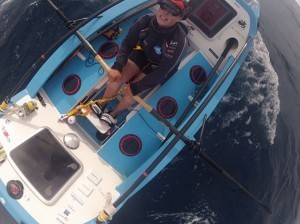
Life at sea
The book: A Dip in the Ocean
London to London via the World
Sarah and Gulliver run into a typhoon – a terrifying account
December 6, 2013
Just Because You Can’t Manifest, Doesn’t Make You A Loser
The other day I was talking with a friend who is at an interesting point in her life, with all the cards up in the air, wanting to know where they might fall. Holding her back are some financial considerations, and us both being of a somewhat spiritual inclination, we got talking about how to manifest abundance in our lives.

E Squared, by Pam Grout
I mentioned E-Squared: Nine Do-It-Yourself Energy Experiments That Prove Your Thoughts Create Your Reality , a book by Pamela Grout presently climbing the charts in the Mind, Body, Spirit category (and you can also find it on Scribd). Being hailed as the new The Secret, it sets out to prove, yes prove, that we draw from the field of infinite possibilities according to our beliefs and expectations. In other words, ask, and ye shall receive, as the Bible so succinctly put it.
, a book by Pamela Grout presently climbing the charts in the Mind, Body, Spirit category (and you can also find it on Scribd). Being hailed as the new The Secret, it sets out to prove, yes prove, that we draw from the field of infinite possibilities according to our beliefs and expectations. In other words, ask, and ye shall receive, as the Bible so succinctly put it.
“I tried it,” my friend said. “And it didn’t work. So now I feel like a failure.”
There are several possible explanations for her disappointment. In ascending order of cynicism:
- My friend had a blockage. On some level, even subconsciously, she didn’t truly believe that she would receive abundance, and the universe could sense her ambivalence so it didn’t deliver.
- The universe will deliver. It’s just waiting for the time to be right, which it knows better than she does. She should keep the faith and be patient.
- The universe has delivered. She just didn’t recognize it. Look at all the wonderful privileges of the Western lifestyle that she enjoys. If she wants more, maybe her expectations are too high.
- The universe has something better in mind for her. What she thinks she wants is not actually what is best for her right now.
- She needs to hone her mindfulness practice, and will access the abundance that is waiting for her only once she has reached the requisite standard.
- She needs to get off the sofa and do her part. While everything comes to she who waits, it comes a lot faster to she who gets off her backside and does something about it.
- Books like this create lots of abundance – for the people who write them (I did warn you it would get cynical). They prosper by offering a lifeline to a struggling and vulnerable reader. In an era when fame can be conferred overnight by Big Brother, or a fortune by the Lottery, we are especially susceptible to the offer of a minimum-effort, maximum-results, instant-gratification option that takes, as E-Squared says, “absolutely no money and very little time expenditure”.

Creating our world?
Okay, so maybe that last explanation was a little too cynical, and I am certainly not accusing Pam Grout of any such devious manipulations.
I certainly do believe that there are things that exist in this universe that are beyond the paltry five senses of humankind, and that strange and seemingly magical serendipities can arise when we have absolute clarity of purpose. I have witnessed this myself. Sometimes I have had an incredible run of good luck, and felt like I was surfing a wave of good fortune.
But sometimes we fall off the wave, and have to swim hard to get back to the surface, even while the full force of the wave is pounding us back down under the water. Even those who seem to live blessed lives, and everything they touch turns to gold, have mostly had to put in the hard graft too.
Magic and manifestation only get you so far. At some point – before, after, or during your ride on the wave – you will need to draw on those invaluable human strengths, of determination, discipline, and dedication, to succeed.
So go easy on yourself – just because you can’t manifest, doesn’t make you a loser.
December 4, 2013
Adventure Podcast #14: Leon McCarron, Enjoying the Requisite Amount of Misery
Leon McCarron is a Northern Irish adventurer, filmmaker, writer and motivational speaker.
He has cycled 14,000 miles from New York to Hong Kong, walked 3,000 miles across China, walked 1,000 miles through the Empty Quarter and then rode a folding bike around the UK, with smaller things in between.
Last month I attended the premier of the film about his trek through the Empty Quarter, an expedition which took place in 2012 in the company of our mutual friend Al Humphreys, an early guest on this podcast.
To subscribe to the show via RSS or iTunes, please click on the appropriate button below.
The Requisite Amount of Misery for a Good Adventure
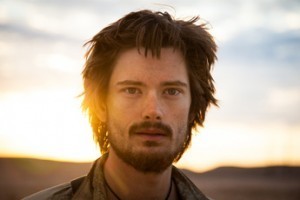
Leon McCarron
“Better to suffer in liberty than delight in captivity.” (Mongolian proverb)
“There’s a whole breed of adventurers these days who seem to survive on misery…. There is something wonderful about misery.” (Leon McCarron)
While few adventurers would say that they actively enjoy suffering, it does seem to be a trademark of many adventures, to the extent that it may start to look like a prerequisite. Ranulph Fiennes, Shackleton, Franklin, Scott, Mallory…. all suffered, some terminally.
It is in the nature of adventure that it should be somewhat unpredictable, to be pushing a boundary, either personal or geographical or physical. And, as I have amply proved to myself, getting outside the comfort zone is, by definition, uncomfortable. You suffer.
I was delighted, in a schadenfreude kind of way, to hear that Leon had experienced the head-in-the-hands, why-am-I-doing-this kind of suffering that I also endured in my early days on the Atlantic.
Eventually I arrived at the realisation, as did Leon, that:
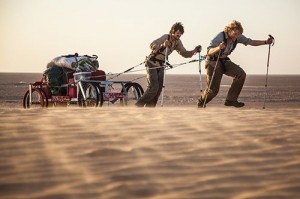
Suffering in the Empty Quarter (with Al Humphreys)
1. While suffering may not be inevitable, it is what makes adventure worthwhile. This allowed me to reconcile myself to being cheerfully miserable.
2. Putting your head in your hands only prolongs the agony. It’s perfectly feasible to be miserable while still making progress towards your goal. Best to get back on the saddle/rowing seat/road, and be miserable on the move.
3. The greater the suffering, the greater the sense of achievement. You’ll remember what you achieved, not how badly it hurt at the time. As Alastair Humphreys says, adventure is all about “selective amnesia and the rewards of retrospective pleasures”.
So I would argue that if it is all nicely packaged up and safe and discomfort-free, it’s a holiday, not an adventure. And while it may be much more enjoyable at the time, it’s not going to make such a good story in the pub afterwards.
“There are times when we must sink to the bottom of our misery to understand truth, just as we must descend to the bottom of a well to see the stars in broad daylight.” (Vaclav Havel)
Show Notes
0:45 This week’s recommendation for an audiobook from our sponsors Audible.com. Follow this link to our Adventure Podcast promotion. We recommend A Game of Thrones by George R R Martin.
3:45 Welcoming Leon McCarron
4:50 How did Leon get into adventure?
6:40 Cycling America 8:55 Investigating people’s passions
10:40 Sustainable transport
11:45 On misery and retrospective amnesia (since attributed to Al Humphreys)
12:50 Home – actual and spiritual
14:25 Global citizenship
15:00 Walking from Mongolia to Hong Kong
19:15 The kindness of strangers (again)
21:55 Gear talk – cart, or backpack?
24:50 Walking as therapy – or not?
27:00 Execrably slow modes of transport
29:15 Just….. Keep….. Going
30:35 Is adventure for everybody? YES! And “adventure” is all relative
32:30 Getting outside your comfort zone
33:55 Riding a folding bike around the British Isles
37:55 Bicycle-friendly cities
40:30 Into the Empty Quarter
Links
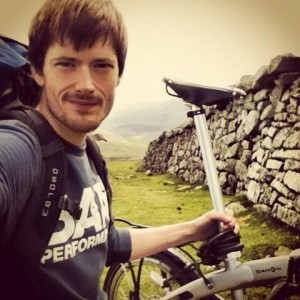
Leon with folding bicycle
Teaser for the Nat Geo TV series about the walk across China
December 2, 2013
Work Smarter, Not Harder, for the Environment
Three passages leaped out at me from this recent article published in the UK’s Guardian newspaper.
1. Save the Humans
Only £5.7m or 0.6% of the total spend by the groups went towards air, noise and water pollution, even though the evidence suggests this is costing Britain more than £10bn a year in healthcare costs, and together receive more complaints than anything else.
Most of the rest of the money went on traditional conservation of plants and animals. This suggests that environmentalism is still generally associated with saving the planet’s flora and fauna, rather than its human inhabitants. This reflects – or perpetuates – the myth that environmentalism is an altruistic endeavour, a luxury.
We need to get the message across that it is not the planet that needs saving, it is the humans.
2. Tackle Root Causes, Not Symptoms
Only 1.2% of their income is spent on activism towards government or corporations, and less than 3% of their income went on trying to get people to behave differently.
While this pattern persists, we are at best slapping a band aid on our problems. Unless governments, corporations and individuals ALL change their behaviour, the impact of most charitable giving to environmental causes is going to be trivial and short-lived.
I’d like to call on donors to environmental charities (you wonderful people!) to ask your chosen causes to divert more of their funds to significant and long-lasting policy change.
3. Combine and Conquer
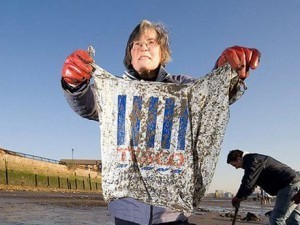
Breaking the Bag Habit
“[There is] a need for a very heavily populated and fragile sector to consolidate, merge and achieve the scale necessary to drive public opinion and force change when working with large business interests and increasingly international institutions,” said one chief executive, who is not named.
Another said: “The sector is overcrowded with many NGOs driven by funding/funders’ agendas or relatively specialist (insignificant?) issues. As a sector we lack any real strategy, nor have we considered building partnership models that could achieve real gains for the environment.”
Amen! It almost makes me want to cry, to see so much money, time, effort, passion and energy expended to so little effect. I am encouraged to see more coalitions emerging, such as the Break the Bag Habit coalition, made up of Keep Britain Tidy, Surfers Against Sewage, the Marine Conservation Society and Campaign for the Protection of Rural England, along with Thames 21 and Greener Upon Thames, which has long been urging the government to follow the example of Wales, Scotland and Northern Ireland and introduce a charge on all single-use carrier bags.
At last they succeeded, and the 5p bag charge will be implemented in 2015, after the election. These organisations may have differences of size, budget, contribution and philosophy, but by putting their differences aside and combining efforts they prevailed.
We all have to live on this Earth. It’s not about what country we come from, or what organisation we belong to – if we all pull together, we CAN make a world of difference!
November 27, 2013
Adventure Podcast #13 – Jamie Bowlby-Whiting, Feeling The Fear and Doing It Anyway
Jamie Bowlby-Whiting caught my eye when he posted a comment on my podcast with Alastair Humphreys. I checked out his website and found that he himself was no stranger to adventure. Last year he spent 6 months hitchhiking through twenty countries in Europe. Earlier this year he rode from Norfolk to Slovakia on a £30 bicycle, then rafted down the Danube on a homemade raft (at least until their voyage was rudely interrupted by some over-zealous police).
Although Jamie modestly wrote, in response to my invitation, that “I’m no record breaker and I am in awe of the people previously on the podcasts”, I felt he’d be a fine fit for our ethos that “adventure is a state of mind”, and I was not disappointed.
To subscribe to the show via RSS or iTunes, please click on the appropriate button below.
On Fear
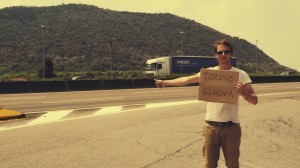
Jamie hitch-hiking
“One of the most valuable lessons that I have learned in life, is not to be fearless, but to manage fear.” (Jamie Bowlby-Whiting)
I’ve been thinking about fear a lot recently, and talked on the subject for an hour on Monday night at Alternatives in London. That talk received such a positive response, the subject really seeming to resonate with the audience, that I am planning a series of blogs on the subject of fear and its counterpart, courage.
The point is not to deny or eradicate fear, but rather to get comfortable with it, to reach a truce that acknowledges the existence of our fears, while not allowing them to hold us back from the most abundant version of our life.
How do we do that? A member of Monday’s audience referred to a theory that once you puncture one fear, your other fears dissolve. I’ve been thinking about this since. While I’m not sure that, say, overcoming your fear of what other people think would dissipate your fear of heights, I’m going to buy into the idea that doing one thing – JUST ONE THING – that deeply scares you, can change your perception from “I am a person who is afraid” to “I am a person who can overcome my fears”. And from there will cascade a series of breakthroughs as you see your other fears for what they are – creations of your own mind.

The Avant Garde Life
Focusing on the fear itself will only make it loom larger in your mind, so the trick is to acknowledge the fear, but refuse to let it stand in your way. Say “hello Fear, my old friend, just go and wait over there while I get on with my life” – or if the fear won’t get out of your way, get out of its way by working around it or over it or under it.
Or you can trump it with a bigger fear. When I turned my life around, I was suitably afraid of the dramatic changes I was making. But since I had done the obituary exercise, I was even more afraid of arriving at the end of my life with a whole load of regret for the life not lived. That fear overcame my fear of change.
I invite you to ask yourself what things you would like to do, but fear is holding you back. Then think about how you can manage those fears so that they are not standing in your way.
“Feel the fear and do it anyway.” (Susan Jeffers)
Show Notes
0:45 Announcement of our new sponsor, Audible.com, and Producer Vic’s book recommendation, Forty Signs of Rain by Kim Stanley Robinson (click here to claim your free audiobook)
5:30 Introducing Jamie Bowlby-Whiting
7:15 Jamie’s childhood in a Great Big Scary World
8:20 How Jamie overcame his fears
10:50 Jamie’s advice on keeping the faith that everything will be okay
12:30 Drawing inspiration from Alastair Humphreys, on the art of living life
13:45 The privilege of choice
14:50 Taking selfies to a whole new level
16:00 Life as a homeless, jobless (but very happy) man, and the kindness of strangers
16:50 Getting arrested in Amsterdam and Budapest
19:15 2013′s Big Adventure
25:15 When the extraordinary is perceived as a threat by the ordinary
26:10 Non-materialism
28:15 “The biggest step is always the first one” – words of advice to novice adventurers
28:50 “So many days that I’ve lived through that I actually remember” – the rewards of the Avant Garde Life
30:30 How to stay in touch with Jamie
Links
A fun video consisting mostly of selfies – some face-painted – as Jamie made his way around Europe
The Avant Garde Life – Jamie’s manifesto
November 20, 2013
Adventure Podcast #12: Katharine and David Lowrie, Running for the Environment
Katharine and David Lowrie are a married couple who ran the length of South America, from south to north. They ran 6,504 miles in 15 months (equivalent of 250 marathons), starting on the day that the 2012 Olympics started, and finishing just a few weeks ago.
In a laughter-filled yet informative conversation, we discuss barefoot running, navigating by birdlife, the challenges of running with one’s spouse, and much more besides.
To subscribe to the show via RSS or iTunes, please click on the appropriate button below.
Paying Our Rent
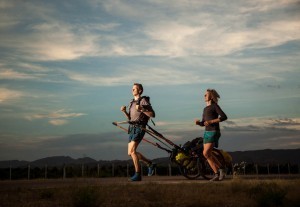
Dave and Katharine
“We really felt that it was about time that we paid our rent for living on this planet…” (Katharine Lowrie) “We think it’s a fantastic place to be, and we have an obligation to pay back.” (Dave Lowrie)
I loved the way that Dave and Katharine described their relationship with our Earth, explaining why they have run 6,504 miles to inspire others to take better care of it.
I too firmly believe that our relationship with nature should be one of give-and-take, not take-take-take, as all too often it seems to be these days.
We don’t own the Earth, as Katharine reminded us. It’s not ours to use up and wear out, and hog all its resources for ourselves.
Nor are we squatters, illegally occupying a place that isn’t ours. We have a right to be here, but we also have a corresponding obligation to take good care of the place.
“Renting” seems by far the most appropriate term for our occupation here. We get to enjoy all the benefits of a remarkable eco-system – water, food, sunshine, and beauty – and in return all we should be doing is to leave the place nice for future inhabitants.
We also have to share it with our fellow tenants, the flora and fauna that are increasingly being squeezed into reserves and sanctuaries, rather than being allowed the space and resources to flourish.
Right now we’re falling down on our side of the bargain. We’re trashing the place. We will need to give the Earth back when we’ve finished with it, and at this rate it will be showing far more than normal wear and tear.
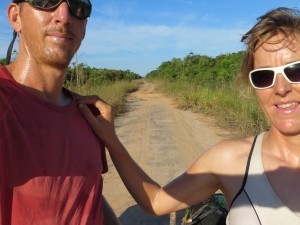
Sweaty in South America
“The earth does not belong to us. We belong to the earth.”
(Chief Seattle, The Chief Seattle’s Speech)
“Earth provides enough to satisfy every man’s needs, but not every man’s greed.”
(Mahatma Gandhi)
Show Notes
1:45 The joys of a daily 4am start
2:30 Life before running
4:10 Preparing for running South America
5:20 Learning to run again – barefoot
8:20 Blogging from the road
9:15 Paying our rent for living on this planet, one step at a time
10:30 Birdwatching – linking you with Nature, no matter where you are
12:00 Navigating by birdlife
14:20 Environmental challenges in South America
15:40 The importance of buying local to reduce your environmental footprint
19:25 The educational outreach – online and in person
23:10 That awful “ToysRUs” advert: http://www.youtube.com/watch?v=q5SXyb...
24:50 Is running 6,504 miles good for your marriage? And tropical birds as marriage therapists
27:10 What next?
28:20 The joys of running and wildlife watching
29:20 Staying in touch with the Lowries
Links
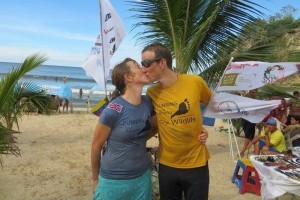
Finished! Arriving in the Caribbean
Expedition website for the 5000 Mile Project – and beyond
Educational outreach – Big Toe Classroom
Blog (recommended!). I especially enjoyed this provocative post about why Avaaz is pants. Signing a petition is not changing the world.
Very good and informative video on a day in the life of a 6,500 mile runner
Check out these great DOing pledges, and the CO2 savings made by lifestyle changes
November 18, 2013
Environmental Fatigue
I am suffering from Environmental Fatigue.
It was absolutely wonderful last week to get such a chorus of congratulations and approval for my blog post about my trip to the Palace to get my MBE, and I realized I’d been missing that feedback while I’ve been blogging about earnest subjects like the environment.
Although I always try to put a positive spin on anything I write about the environment (“we CAN do it – one oarstroke at a time!”) it seems that, no matter how I present it, it does not elicit the enthusiastic response that a brush with royalty does.
Yet, in the overall scheme of things, my MBE is a minor and ephemeral event, while the damage we are doing to the Earth is serious and long-lasting.
It seems that talking about the environment is just not sexy. It’s not fun. It doesn’t make us smile or feel good. It might be vitally important, but it’s often quite boring. The triumphs tend to be long-fought and hard-won, and too often too small in relation to the problems.

Woody Allen
What do you think? Do you know any good examples of ways to make environmental responsibility more fun and appealing? How can we celebrate our successes in a way that breeds more success?
I shall leave the last word to that well-known environmentalist (?!), Woody Allen:
“Mankind faces a crossroads. One path leads to despair and utter hopelessness. The other, to total extinction. Let us pray we have the wisdom to choose correctly.”





